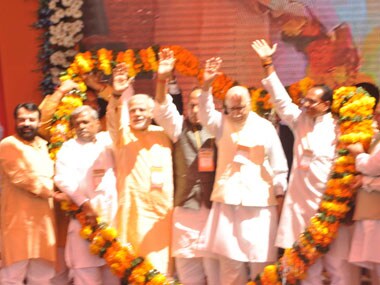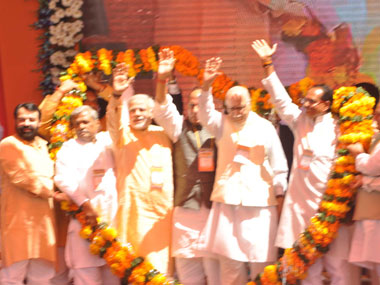modi~fy: to shift the blame for violence on to its victims. Thus, ‘Amit began to modify the history of the Gujarat pogrom in 2002.’ modi~sh: a sense of style centred on half-sleeved orange kurtas with Chinese collars. ‘Six modish men with furry arms sat round a small table at the Centre, speaking of Turks and Trojan horses.’ Mukul Kesavan is clearly having fun with his
lexical sampler
of words that could get traction as the Modi juggernaut rolls ahead. Most of those attending Modi’s great rallies will likely not be amused by Kesavan’s wit. That’s not because they or their leader do not have a sense of humour. Modi’s speech at the mammoth rally in New Delhi was in fact laced with heavy doses of humour. It’s just a very different kind of humour – more direct and less dependent on punnish word play. [caption id=“attachment_1152599” align=“alignleft” width=“380”]
 Naresh Sharma/Firstpost[/caption] Blasting Manmohan Singh for peddling poverty in the West, Modi wondered what kind of poverty he was talking about. Was it the kind that’s visible daily in our lanes and alleys? Or was it, he wondered archly, “the state of the mind” kind? The crowd laughed uproariously at his sly jab at Rahul Gandhi’s “poverty is a state of the mind” comment. What Modi, bristling as always with aggressive self-confidence, has done is remove from his speeches that hint of shuffling apology that has often characterized the urban educated Indian’s relationship to Hindi. The days when Indians puffed up with pride at hearing Indira Gandhi’s clipped English at press conferences in Washington DC are fading fast. Atal Bihari Vajpayee punctured that balloon of false pride by choosing to address the UN in Hindi. Modi, in his speeches, whether in Gujarati at home, or in Hindi outside the state, delivers it a mortal blow. One of the most abiding impressions of his mammoth Delhi rally on Sunday was left not by his words, but by the odd sight of foreign delegates seated on a side stage – deliberately placed in full sight of the mammoth crowds – sitting quietly for hours, listening to a speech they did not understand. It was an image that conveyed power almost as potently as Modi’s actual oratory. Modi made no concessions to them either. There was little, by way of crumbs in English, tossed their way. This kind of confidence is still something novel for us in India. Earlier this week I was at a literary conference in Mussoorie at the Lal Bahadur Shastri academy attended by IAS probationers from across the country. At a session of English in relation to other Indian languages, one young officer lamented that we still felt awkward about goofing up while speaking English. On the other hand, said another officer, we seem to feel no embarrassment about saying our Hindi sucks even when we come from a Hindi-speaking family. The tension in the relationship between English and Indian languages is well-known and longstanding. English has never been just another language. It’s always been the language of power and aspiration as Farsi once was in the imperial courts. It has been a language that has erased difference and yet also imposed its own hierarchy. We have wielded our command over it as a weapon to silence others and often garner undeserved clout based on accent rather than content. Putting English on a pedestal has had consequences. At the same IAS literary festival, diplomat and writer, Pavan K. Verma encourage the attendees to write but in their mother tongue as much as possible. “English is the language of communication,” he said. “But in order to write in English we often write with mediocrity.” Modi clearly understands this. Though he is apparently competent in English, he chooses to talk in the language he feels most comfortable in, whether it’s at a rally in Delhi or Trichy or speaking to the female captains of industry at FLOH. Whatever his politics, Modi deserves credit for forcing us to pay attention to him on his terms, in the language of his choice. He understands and taps into the resentment of those who feel left out of the conversation because they trip up on its wordplay. But the danger is that resentment can also become toxic in its backlash. Kiran Nagarkar began his writing career in Marathi but then switched to English. He said that when his famous novel Ravana and Eddie came out in its Marathi translation it was sent to 36 Marathi newspapers. None reviewed it or even carried a short blurb about it. In fact, he said, Marathi wags coined a phrase for him calling him the kiran (ray of sunshine) that thought of itself as the sun. Writing in English, even worse, success in English, was viewed as a betrayal of the mother tongue. Modi shears English of the privilege it enjoys. But whether it leads to linguistic triumphalism of another sort, where the embrace of one becomes dubbed the betrayal of the other, remains to be seen. The difference between confidence and arrogance is always a thin line. For now we are just getting used to this new lingua-scape. At the Delhi rally as Modi launched into the story of Manmohan Singh’s great apmaan at the hands of Nawaz Sharif, a journalist from a Tamil newspaper leaned across to me. “What did he say exactly?” he whispered. Though he could understand Hindi, he was clearly struggling to keep pace with Modi’s shudhh barrage. So it had come to this – a Bengali, whose grasp of Hindi was fairly shaky to begin with, was trying to explain Modi-speak to a Tamilian with an even shakier grasp over the language. A clumsy game of Indian whispers? Or we could read it as the beginning of a very different kind of linguistic hegemony – this time of Hindi.
Naresh Sharma/Firstpost[/caption] Blasting Manmohan Singh for peddling poverty in the West, Modi wondered what kind of poverty he was talking about. Was it the kind that’s visible daily in our lanes and alleys? Or was it, he wondered archly, “the state of the mind” kind? The crowd laughed uproariously at his sly jab at Rahul Gandhi’s “poverty is a state of the mind” comment. What Modi, bristling as always with aggressive self-confidence, has done is remove from his speeches that hint of shuffling apology that has often characterized the urban educated Indian’s relationship to Hindi. The days when Indians puffed up with pride at hearing Indira Gandhi’s clipped English at press conferences in Washington DC are fading fast. Atal Bihari Vajpayee punctured that balloon of false pride by choosing to address the UN in Hindi. Modi, in his speeches, whether in Gujarati at home, or in Hindi outside the state, delivers it a mortal blow. One of the most abiding impressions of his mammoth Delhi rally on Sunday was left not by his words, but by the odd sight of foreign delegates seated on a side stage – deliberately placed in full sight of the mammoth crowds – sitting quietly for hours, listening to a speech they did not understand. It was an image that conveyed power almost as potently as Modi’s actual oratory. Modi made no concessions to them either. There was little, by way of crumbs in English, tossed their way. This kind of confidence is still something novel for us in India. Earlier this week I was at a literary conference in Mussoorie at the Lal Bahadur Shastri academy attended by IAS probationers from across the country. At a session of English in relation to other Indian languages, one young officer lamented that we still felt awkward about goofing up while speaking English. On the other hand, said another officer, we seem to feel no embarrassment about saying our Hindi sucks even when we come from a Hindi-speaking family. The tension in the relationship between English and Indian languages is well-known and longstanding. English has never been just another language. It’s always been the language of power and aspiration as Farsi once was in the imperial courts. It has been a language that has erased difference and yet also imposed its own hierarchy. We have wielded our command over it as a weapon to silence others and often garner undeserved clout based on accent rather than content. Putting English on a pedestal has had consequences. At the same IAS literary festival, diplomat and writer, Pavan K. Verma encourage the attendees to write but in their mother tongue as much as possible. “English is the language of communication,” he said. “But in order to write in English we often write with mediocrity.” Modi clearly understands this. Though he is apparently competent in English, he chooses to talk in the language he feels most comfortable in, whether it’s at a rally in Delhi or Trichy or speaking to the female captains of industry at FLOH. Whatever his politics, Modi deserves credit for forcing us to pay attention to him on his terms, in the language of his choice. He understands and taps into the resentment of those who feel left out of the conversation because they trip up on its wordplay. But the danger is that resentment can also become toxic in its backlash. Kiran Nagarkar began his writing career in Marathi but then switched to English. He said that when his famous novel Ravana and Eddie came out in its Marathi translation it was sent to 36 Marathi newspapers. None reviewed it or even carried a short blurb about it. In fact, he said, Marathi wags coined a phrase for him calling him the kiran (ray of sunshine) that thought of itself as the sun. Writing in English, even worse, success in English, was viewed as a betrayal of the mother tongue. Modi shears English of the privilege it enjoys. But whether it leads to linguistic triumphalism of another sort, where the embrace of one becomes dubbed the betrayal of the other, remains to be seen. The difference between confidence and arrogance is always a thin line. For now we are just getting used to this new lingua-scape. At the Delhi rally as Modi launched into the story of Manmohan Singh’s great apmaan at the hands of Nawaz Sharif, a journalist from a Tamil newspaper leaned across to me. “What did he say exactly?” he whispered. Though he could understand Hindi, he was clearly struggling to keep pace with Modi’s shudhh barrage. So it had come to this – a Bengali, whose grasp of Hindi was fairly shaky to begin with, was trying to explain Modi-speak to a Tamilian with an even shakier grasp over the language. A clumsy game of Indian whispers? Or we could read it as the beginning of a very different kind of linguistic hegemony – this time of Hindi.
Modi's language of choice: A new era of Hindi hegemony?
Sandip Roy
• October 4, 2013, 13:29:00 IST
Once we admired Indira Gandhi for her clipped English at press conferences abroad. Now the times are changing as we see foreign delegates listening politely to Modi deliver a speech entirely in Hindi.
Advertisement
)
End of Article